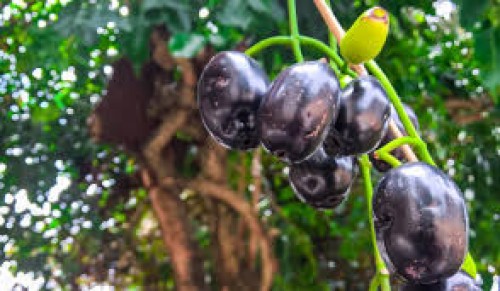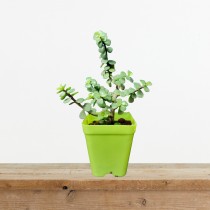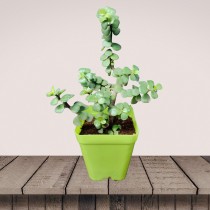off
-
Sold
-

out
Jamun (Java Plum) Plant: Care, Advantages & Nature
The Jamun (also known as Java Plum or Black Plum) is a tropical fruit-bearing tree native to the Indian subcontinent and Southeast Asia. The tree is renowned for its dark purple, almost black fruit and its wide range of health benefits. The Jamun plant is highly valued for its nutritional properties, medicinal uses, and ease of growth in tropical and subtropical climates.
Care of the Jamun (Java Plum) Plant
The Jamun tree is relatively easy to grow and requires specific care to ensure proper growth and fruit production. Here are the key care guidelines:
- Climate: Jamun trees thrive in tropical and subtropical climates. They prefer warm temperatures with a minimum of 6 hours of full sunlight daily. The tree is frost-sensitive and does not tolerate cold weather.
- Soil: The plant grows best in well-drained, loamy or sandy soil. It can tolerate a variety of soil types, including slightly saline soils. Ensure the soil is rich in organic matter for optimal growth.
- Watering: While the Jamun tree is drought-tolerant once established, it still requires regular watering during dry periods. Water the plant deeply, but avoid over-watering as it can lead to root rot. Keep the soil moist but not waterlogged, especially during the growing season.
- Fertilization: The tree benefits from periodic fertilization, particularly during the early stages of growth. Apply balanced fertilizer in the spring to promote healthy growth and fruit production. Organic compost is also an excellent option for improving soil fertility.
- Pruning: Pruning helps maintain the shape of the tree and remove any dead or damaged branches. This promotes better airflow and encourages healthy fruit production. Prune the tree after the fruiting season to avoid interfering with the flowering process.
- Pest & Disease Control: Jamun trees are relatively resistant to pests and diseases but may occasionally face issues with aphids, mealybugs, or fungal infections. Use organic pest control methods like neem oil to address infestations if needed.
Advantages of the Jamun (Java Plum) Plant
- Rich Nutritional Value: Jamun fruits are rich in vitamin C, iron, potassium, calcium, and fiber. The fruit and its seeds are packed with antioxidants, which help protect the body against oxidative stress and support overall health.
- Health Benefits: The Jamun fruit is known for its medicinal properties. It helps regulate blood sugar levels, making it beneficial for people with diabetes. It also aids digestion, supports heart health, and has anti-inflammatory properties.
- Detoxifying Properties: Jamun is known to purify the blood, remove toxins from the body, and improve liver function. It is also used in traditional medicine for managing various digestive and respiratory issues.
- Delicious Fruit: The Jamun fruit is not only nutritious but also delicious. It has a sweet, tangy taste and is consumed fresh, juiced, or dried. Jamun is often used to prepare jams, syrups, and beverages.
- Low Maintenance: Once established, Jamun trees require minimal maintenance. They are drought-tolerant and resistant to many pests, making them a great choice for gardeners in tropical regions with minimal water availability.
- Ornamental Value: The Jamun tree is an attractive, fast-growing plant that adds aesthetic value to gardens and landscapes. It provides shade and has a pleasant canopy of dense foliage, making it suitable for large garden spaces.
Nature of the Jamun (Java Plum) Plant
The Jamun tree is a medium to large evergreen tree that can grow up to 30 feet (9 meters) tall, with a spread of up to 20 feet (6 meters). The tree has a broad, dense canopy with dark green, leathery leaves. The fruit is oval in shape, typically about 1 to 1.5 inches long, with smooth, dark purple to black skin. The flesh of the fruit is soft, juicy, and filled with a single seed.
Jamun trees are known for their hardy nature and can grow in a variety of soils, including slightly saline or alkaline conditions. The tree produces flowers that are small and white, which are pollinated by insects. After pollination, the tree bears fruit during the summer months, which ripen in late summer to early fall.
The Jamun tree has a deep root system that makes it drought-tolerant once established, though it requires regular watering in the early years to establish its roots. The tree is also capable of surviving in somewhat poor soil conditions, making it suitable for marginal lands and low-maintenance gardens.
Jamun trees can live for many years, and once mature, they produce fruit annually. The fruit is typically harvested by hand or allowed to fall naturally when fully ripe. The tree’s extensive root system also makes it an excellent choice for soil erosion control in tropical regions.
Conclusion
The Jamun (Java Plum) plant is an excellent choice for gardeners looking for a fruit tree that provides both health benefits and aesthetic value. With its rich nutritional profile, medicinal properties, and ease of care, the Jamun tree is a versatile addition to any tropical or subtropical garden. Whether you’re growing it for its delicious fruit or its ability to improve soil health, the Jamun plant is sure to be a rewarding investment for years to come.

